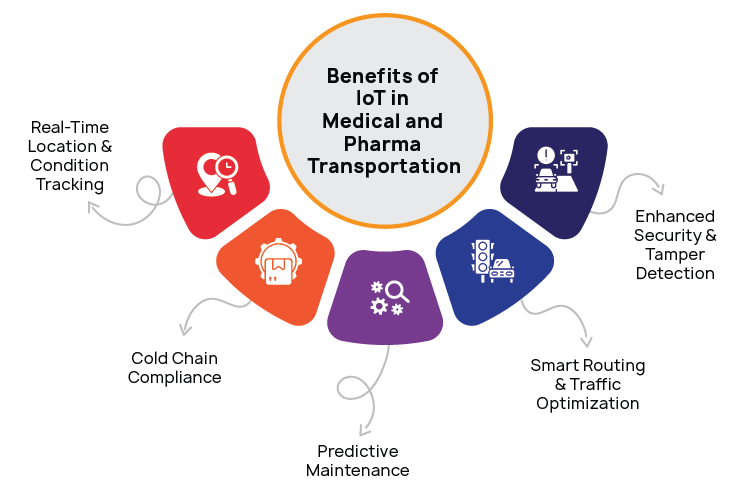

ACL Digital
5 Minutes read
Revolutionizing Medical & Pharmaceutical Logistics with IoT
The rapidly expanding healthcare industry, combined with an aging population, presents tremendous opportunities in the medical sector. As the need for accessible, responsive, and efficient transportation grows, the integration of Internet of Things (IoT) technologies is transforming how Medical Transportation (MT) systems function.
Medical Transportation must not only respond swiftly in emergencies but also cater to the routine mobility needs of the elderly and chronically ill. This is where the IoT-enabled Med-Tech industry becomes a game-changer—connecting vehicles, patients, healthcare providers, and data in real-time to improve access, reduce costs, and enhance care.
The global IoT report indicates the IoT-driven transportation sector with a compound annual growth rate (CAGR) of 14.5% from 2021 to 2026 to reach a market value of $495.57 billion by 2030.
Challenges in Current Medical Transportation (MT) Systems
Globally, lack of accessible transportation remains a major barrier to receiving timely and appropriate medical care—particularly for seniors, individuals with disabilities, low-income groups, and those living in rural areas. These challenges are often worsened by limited or inadequate health insurance coverage. As a result, the healthcare system faces several consequences:
- Reduced frequency of medical visits and higher costs per trip due to limited options.
- Delays in seeking care, with individuals only traveling for urgent or critical medical needs.
- Limited access to preventive care, such as wellness check-ups, screenings, and vaccinations, leading to neglect of personal health.
- Over-reliance on emergency services, increasing strain on emergency medical transportation and facilities.
- Escalating healthcare costs, driven by deteriorating health conditions and avoidable complications resulting from missed or delayed care.
Benefits of IoT in Medical and Pharma Transportation
IoT enhances logistics in the pharma sector through a combination of data, automation, and real-time tracking:
Real-Time Location & Condition Tracking
Pharma transport vehicles equipped with IoT sensors can provide live updates on shipment location, ambient temperature, humidity, and shock exposure—ensuring adherence to regulatory norms.
Cold Chain Compliance
IoT devices in cold chain containers monitor storage conditions for vaccines and temperature-sensitive medicines. Cloud dashboards and automated alerts enable immediate intervention if conditions deviate from the required range.

Predictive Maintenance
IoT sensors help transport operators identify vehicle issues before they escalate into breakdowns, reducing downtime and preventing delays in deliveries of medical devices.
Smart Routing & Traffic Optimization
Real-time traffic data helps reroute deliveries to avoid congestion, ensuring on-time arrival for time-sensitive supplies like organs or emergency medication.
Enhanced Security & Tamper Detection
IoT-enabled locking mechanisms and tamper alerts ensure that high-value or controlled substances reach their destinations without unauthorized access.
Use Cases of IoT-driven Medical Transportation & Logistics
Tracking and Monitoring of Temperature-Sensitive Drugs
IoT sensors continuously monitor the temperature and humidity levels during storage and transit. It helps to ensure that temperature-sensitive drugs such as vaccines, insulin, and biologics are maintained within the required range. The pharmaceutical company shipping vaccines uses IoT-enabled temperature loggers inside cold chain containers. If the temperature exceeds the safe limit, an alert is sent to logistics personnel. That allows them to take immediate action and prevent spoilage.
Automated Inventory Management Systems
IoT-enabled inventory systems use RFID tags and smart shelves to monitor stock levels in real-time. These systems detect low inventory, track expiry dates, and automatically trigger restocking alerts or orders. A hospital pharmacy implements an IoT-based inventory system that tracks medication usage and automatically places reorders when stock falls below a threshold, minimizing stockouts and ensuring patient care continuity.
IoT tracking devices with GPS and environmental sensors are attached to pharmaceutical shipments. These devices provide real-time updates on the shipment’s location and conditions, such as temperature, light exposure, or shock. A global pharmaceutical distributor uses GPS and environmental sensors to monitor long-haul shipments of oncology drugs. Real-time data enables route optimization and ensures compliance with cold chain protocols throughout the journey.
Preventing Drug Counterfeiting
IoT devices, combined with blockchain or cloud platforms, can track the movement of drugs across the supply chain. Each product is given a unique identifier, making it easier to verify authenticity and trace its journey from the manufacturer to the end user. A drug manufacturer integrates IoT-based serialization with blockchain technology to ensure authenticity. Pharmacies and patients can scan the QR code on the packaging to view the complete product journey and confirm it’s not counterfeit.
Basic Life Support Ambulance (BLS)
BLS ambulances transport patients needing non-critical medical support and are now enhanced with IoT. Telemetry-connected devices relay live patient data to the destination hospital, preparing care teams in advance. IoT-enabled inventory systems help EMTs manage supplies like oxygen or medications efficiently. Hospital systems can also schedule IoT-integrated BLS services before discharge, ensuring smoother transitions for patients.
Advanced Life Support Ambulance (ALS)
During emergencies, ALS ambulances carry more critical equipment and paramedics capable of providing advanced care. IoT connectivity allows paramedics to monitor vital signs live and transmit them to ER doctors en route. Medication administration is recorded and synced instantly with cloud systems. On the other side, smart equipment like auto-injectors and defibrillators log usage and diagnostics in real time for improved continuity of care.
Flight Escort Services
Flight escort services help patients who are fit to fly but require medical supervision. Wearable IoT health devices track the patient’s vitals throughout the journey and share data with escort nurses and medical teams. IoT platforms also assist with seamless coordination between airlines, airports, and ground transportation. AI-enabled tools optimize multi-leg trips to reduce delays and ensure medical support is available at every stage.
Courier Medical Transport
IoT is transforming medical courier services. Biological samples such as blood, tissue, and organs are easily transported with advanced systems. IoT-driven temperature-controlled containers ensure proper storage throughout the journey. GPS and geo-fencing allow real-time tracking, while chain-of-custody sensors automatically log handling activity, ensuring HIPAA compliance and safe delivery to labs, clinics, or research centers.
ACL Digital Expertise in IoT and Cloud
ACL Digital’s deep expertise in IoT and cloud technologies extends seamlessly into the realm of medical transportation, enabling smarter, safer, and more connected healthcare mobility. By integrating real-time data tracking, predictive maintenance, remote diagnostics, and secure cloud platform. We deliver end-to-end IoT solutions starting with ideation to manufacturing support, helping OEMs and device manufacturers to develop smarter, safer, and more efficient solutions.




